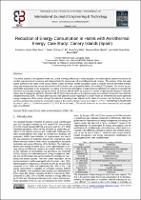Please use this identifier to cite or link to this item:
https://repositorio.usj.es/handle/123456789/383
| Title: | Reduction of energy consumption in hotels with aerothermal energy. Case study: Canary Islands (Spain) |
| Authors: | Díaz Pérez, F. J.



Chinarro Vadillo, David 


Pino Otín, Rosa 

Guardiola Mouhaffel, Ali Adib 

|
| Keywords: | Energy efficiency; Hotels; Aerothermal energy; SCADA; PLC; DHW |
| Issue Date: | 2018 |
| Publisher: | Science Publishing Corporation Inc |
| Citation: | Díaz Perez, F. J., Chinarro, D., Otín, M. R. P., Martín, R. D., & Mouhaffel, A. G. (2018). Reduction of energy consumption in hotels with aerothermal energy. case study: Canary islands (spain). International Journal of Engineering and Technology(UAE), 7(3), 127-131. doi:10.14419/ijet.v7i3.32.18412 |
| Description: | This article presents a management model and control of energy efficiency in hotels adapted to the consumption patterns that ensure the comfort requirements of customers and integrated into the environment of an intelligent tourist complex. The analysis of the hot water system (DHW) of two hotels in the Canary Islands (Spain) in relation to their occupation, yields a solution based on renewable energies using high temperature heat pumps with aerothermal dissipation and supported by boilers of existing LPG propane. The control by programmable automatons (PLC) integrated in a system of control and acquisition of data (SCADA) optimizes the systems to maintain the maximum accumulated energy during the periods of cheapest electric tariff, by means of a system of opening and closing of hydraulic Valves that It manages to adjust the demand of DHW consumption to achieve the highest energy accumulation during the hours with the cheapest electricity tariff. The result after two and a half years of activity registration is a faster return on investment due to the optimized energy management of the system, through the control of operating hours adjusted to the needs of customers and the hourly rate. It has also been predicted that during the estimated 12 years of the system will have saved more than € 1,179,737 and thermal 8,780,005 kWh in a hotel 1 and € 1,315,104 and thermal 9,522,301 kWh in the hotel 2. This model shown can be seen how economically and energetically very efficient |
| URI: | https://repositorio.usj.es/handle/123456789/383 |
| ISSN: | 2227-524X |
| Appears in Collections: | Artículos de revistas |
Files in This Item:
| File | Description | Size | Format | |
|---|---|---|---|---|
| Reduction of energy consumption in hotels with aerothermal energy.pdf | 518,05 kB | Adobe PDF |  View/Open |
This item is licensed under a Creative Commons License

